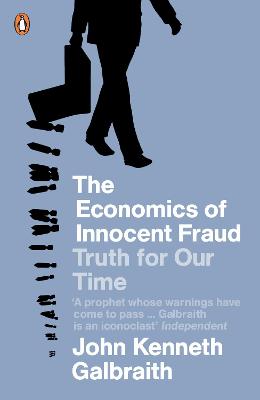Pocket Penguins 70's S.
1 total work
First published in 2004, John Kenneth Galbraith's The Economics of Innocent Fraud is an extraordinarily prescient analysis of capitalism that has even greater power and relevance for our times.
In this vigorous polemic John Kenneth Galbraith, a lifelong critic of unbridled corporate power, distils years of expertise to deliver a scathing attack on the modern financial system.
Sounding the alarm on the gap between 'conventional wisdom' - a phrase he coined - and reality, Galbraith warns that the private sector and the public realm are becoming increasingly intertwined. He shows how politics and the media have colluded in the myth of a benign market system, accepting obscene pay gaps and unrestrained self-enrichment - ultimately meaning that we have come to condone legal, legitimate, 'innocent' fraud.
'An almost indecently pleasurable read'
The Times
'I agree with Galbraith. The bonus culture is skim, bribery, corporate theft'
Simon Jenkins, Guardian
'The most stylish writer on economics of the past half-century ... it will please those who appreciate Galbraith's dry wit and laconic iconoclasm'
Financial Times
'America's great liberal economist, the intellectual heir to John Maynard Keynes'
Economist
John Kenneth Galbraith (1908-2006) was a Canadian-American economist. A Keynesian and an institutionalist, Galbraith was a leading proponent of 20th-century American liberalism and progressivism. Galbraith was the author of 30 books, including The Economics of Innocent Fraud, The Great Crash: 1929, and A History of Economics. He was awarded honorary degrees from Harvard, Oxford, the University of Paris and Moscow University.
In this vigorous polemic John Kenneth Galbraith, a lifelong critic of unbridled corporate power, distils years of expertise to deliver a scathing attack on the modern financial system.
Sounding the alarm on the gap between 'conventional wisdom' - a phrase he coined - and reality, Galbraith warns that the private sector and the public realm are becoming increasingly intertwined. He shows how politics and the media have colluded in the myth of a benign market system, accepting obscene pay gaps and unrestrained self-enrichment - ultimately meaning that we have come to condone legal, legitimate, 'innocent' fraud.
'An almost indecently pleasurable read'
The Times
'I agree with Galbraith. The bonus culture is skim, bribery, corporate theft'
Simon Jenkins, Guardian
'The most stylish writer on economics of the past half-century ... it will please those who appreciate Galbraith's dry wit and laconic iconoclasm'
Financial Times
'America's great liberal economist, the intellectual heir to John Maynard Keynes'
Economist
John Kenneth Galbraith (1908-2006) was a Canadian-American economist. A Keynesian and an institutionalist, Galbraith was a leading proponent of 20th-century American liberalism and progressivism. Galbraith was the author of 30 books, including The Economics of Innocent Fraud, The Great Crash: 1929, and A History of Economics. He was awarded honorary degrees from Harvard, Oxford, the University of Paris and Moscow University.
